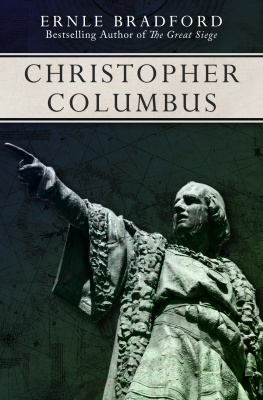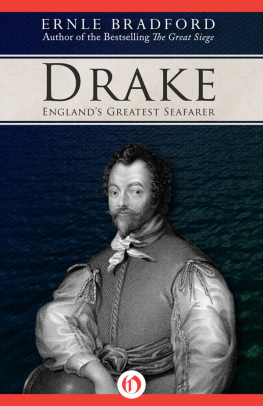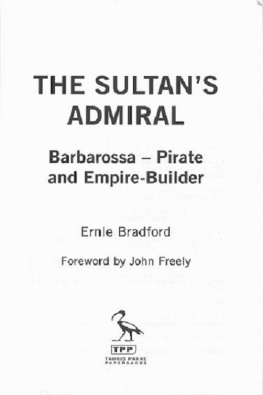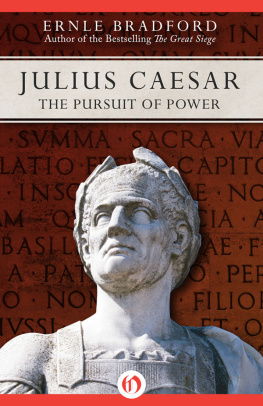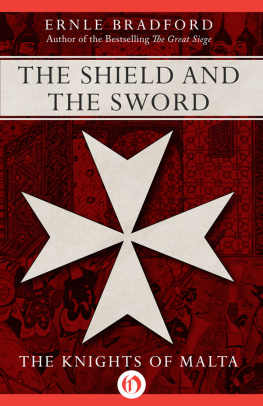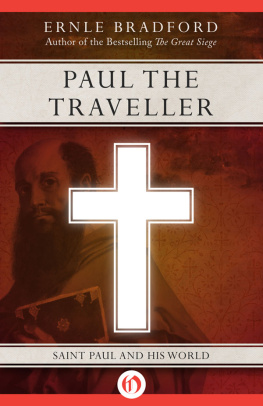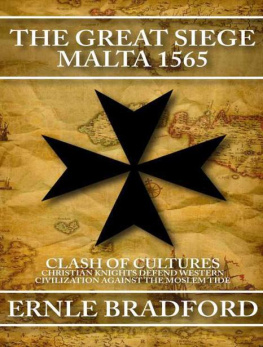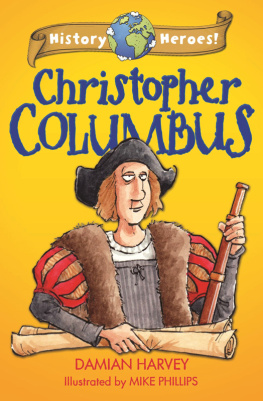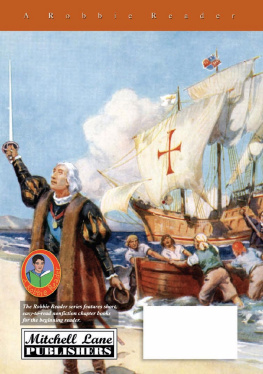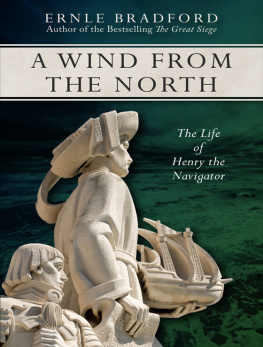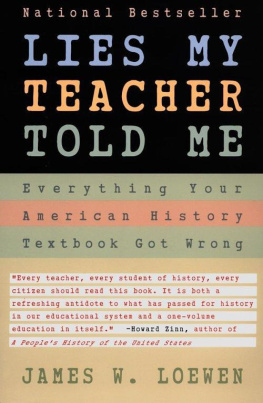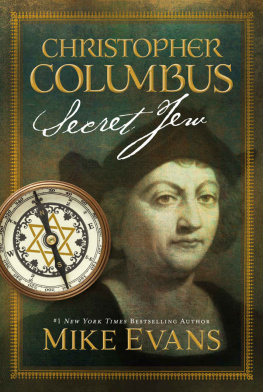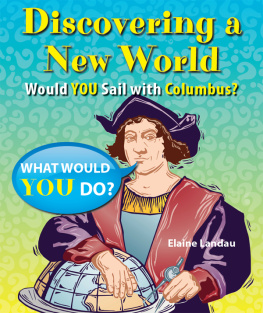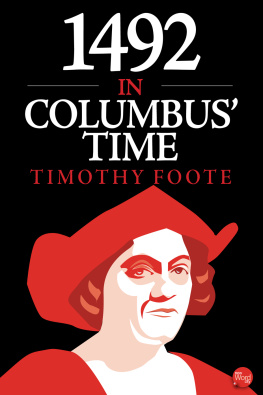Christopher Columbus
Ernle Bradford

E volta nostra poppa al mattino,
dei remi facemmo ali al folle volo,
sempre acquistando dal lato mancino.
Tutte le stella gi dell altro polo
vedea la notte, el nostro tanto basso,
che non surgea fuor del marin suolo.
DANTE: INFERNO, XXVI, 124129.
And turning our stern towards the morning we made wings of our oars for our wild flight, bearing always to the south-west. By nightfall we had raised all the stars of the other pole, while our own had so far declined that it did not rise out of the ocean bed.
A Son of Genoa
In the autumn of 1451 the wife of a wool-weaver in Genoa gave birth to a boy who was destined to change the course of history. Susanna Colombo was herself the daughter of a weaver as was her husbands father. Both families came from Genoa or from the adjacent sea coast of the Genoese Republic. Their loyalties were not to Italy, for Italy as such did not exist. They were proud to call themselves citizens of Genoa, that city which was rightly known as The Superb. Superb both in its wealth, its architecture, and in its pride. Susanna Fontanarossa had married master-weaver Domenico Colombo in 1445. If she had borne any previous children, they must have died in infancy, for this son, who was to be named Christopher, appears as the eldest in the records.
The name Christopher, which he was to make famous in lands hitherto unknown to Europeans, was so apposite that were one writing a work of fiction one would hesitate to bestow it upon the hero. The saint after whom the young Genoese was called was honoured in the Latin Church on July 25th, and was the patron saint of ferrymen. He was said to have been a pagan Syrian who had been converted to Christianity by a hermit and to have been martyred about 150 A.D. during the persecution that occurred in the reign of the Emperor Decius. A simple giant of a man, he was reputed to have found the austerities and spiritual exercises of a hermits life beyond his capabilities, and to have dedicated to God the one gift that he possessed over and above those of his fellowshis strength. At the instigation of his teacher he set himself up at a ford on a bridge-less river, where he gave himself to the task of carrying travellers across from one bank to the other. On one occasion, asleep in the cabin that he had built, he heard a childs voice calling out and asking to be ferried across the river. Christopher picked up his staff, and went outside, and putting the child on his broad shoulders set out into the stream. When he was about half way across he felt his burden become almost unendurably heavy, and it needed all his strength to stop himself from falling and dropping his passenger into the waters that swirled around his knees. On reaching the far bank, panting with exhaustion, he deposited the child in safety and said in some amazement, You have put me in great peril! Never have I known such a weight! Why, if I had had the whole world on my back I do not believe if it could have weighed more than thou! Marvel not! the child replied, for thou hast borne upon thy back the whole world and Him who created it! As proof of his words the child told Christopher to plant his staff next to his cabin, telling him that by next day it would give him both shade and food. The ferryman did as he was ordered and on the following morning found that a spreading date-palm had grown in place of his old staff.
Christopher (meaning the Christ-Bearer) thus became the patron saint not only of ferrymen, but of all the worlds travellers. No name could have been more applicable to the boy who began his life in a lower middle class household in Genoa, and who was to raise islands and a whole continent out of the depths of the Atlantic Ocean. The earliest known chart of the New World, which was dedicated to Christopher Columbus by his friend and shipmate Juan de la Cosa, has a drawing on it of Saint Christopher carrying the Child Jesus on his shoulders. And it was in his capacity as the Christ-Bearer that Columbus saw himself in later years when he introduced to the pagan Indians the religion of the crucified Jesus. That his faith was distorted by ignorant priests or twisted for their own ends by cynical speculators does not detract from the achievement of the Genoese mariner. Of one thing one can be sure in any analysis of the character of Christopher Columbushis patent sincerity and his dedicated Christianity.
The world in which the young Columbus grew up was overshadowed by the massive advance of Islam into Europe. Spearheaded by the martial vigour and hardiness of the Ottoman Turks the Crescent was almost everywhere triumphant over the Cross. In 1453, when Columbus was a child of two, the greatest disaster of all happened: the city of Constantinoplefor so many centuries, the bastion of Christianity in the Eastfell before the all-conquering sword of Mahomet II, so soon to be designated by obsequious and terrified Europe as Mahomet the Magnificent. Remote though Genoa was from the great city on the Golden Horn, the effects of the fall of Constantinople (that ancient Byzantium which the Emperor Constantine had made the first Christian capital of the Roman world) were very soon felt by the merchants and seamenincluding the wool-weaversof a city which, like its hated rival Venice, depended upon trade with the East for its livelihood. Genoa, again like Venice, was a great industrial and commercial centre. It was against this background of keen mercantile rivalry and activity, in a Europe constantly threatened by the ever-increasing power of the Ottoman, that Christopher Columbus grew up.
His father Domenico was a master weaver and a member of the local guild of clothiers. He was, it would seem, a respected citizen since, at a later date when Columbus was nineteen, Domenico was appointed to serve on a committee designed to investigate the conditions and regulations adopted by the clothiers of Savona, with a view to incorporating them into the Genoese industry. Christophers birth was followed a year or so later by that of his brother Bartholomew who was destined to play a large part in his elder brothers life. There was also a sister, Bianchetta, another brother who died while young and, finally, the youngest of all, Giacomo who was born about seventeen years after Christopher. The latter, who was also to accompany him on one of his voyages, is better known by his later Spanish name of Diego. While little is known about Susanna Colombo her husband Domenico emerges from the records as a likeable but unbusinesslike figure; given to buying goods in excess of his ability to pay, and of venturing out into activities that had little or no connection with his real trade. In 1470, for instance, after the family had moved to Savona, Domenico is described as a tavern keeper and his nineteen year old son Christopher signed a bill in acknowledgement of a debt for wine delivered to the tavern. It is clear that even at this age that quality of dependability which was part of his character had shown itself to the world in general. Christophers signature was regarded as more reliable than his fathers.
In appearance, as we know from the descriptions of those who met him in later years, Christopher Columbus was singularly un-Latin. No doubt, in the waves of invaders that had beaten upon the Italian coastline over the centuries since the fall of Rome, some Germanic or other Nordic stock had become mingled with many of the families of the Ligurian coast. True, his nose was aquiline and his face long, but his hair was carroty red, his complexion ruddy rather than olive, and his eyes were blue. Despite the later claims by his brother and others that he had a good formal education there is nothing whatsoever to substantiate it. His Latin, as scholars have pointed out, was clearly learned after he had become a Spanish speaker, and there is hardly any Italian to be found in any of the writings that he left behind him. This is hardly surprising for Genoese was a spoken, not a written, dialect of Italian; it was a far call from the elegances of the language that Dante had forged in Florence.

